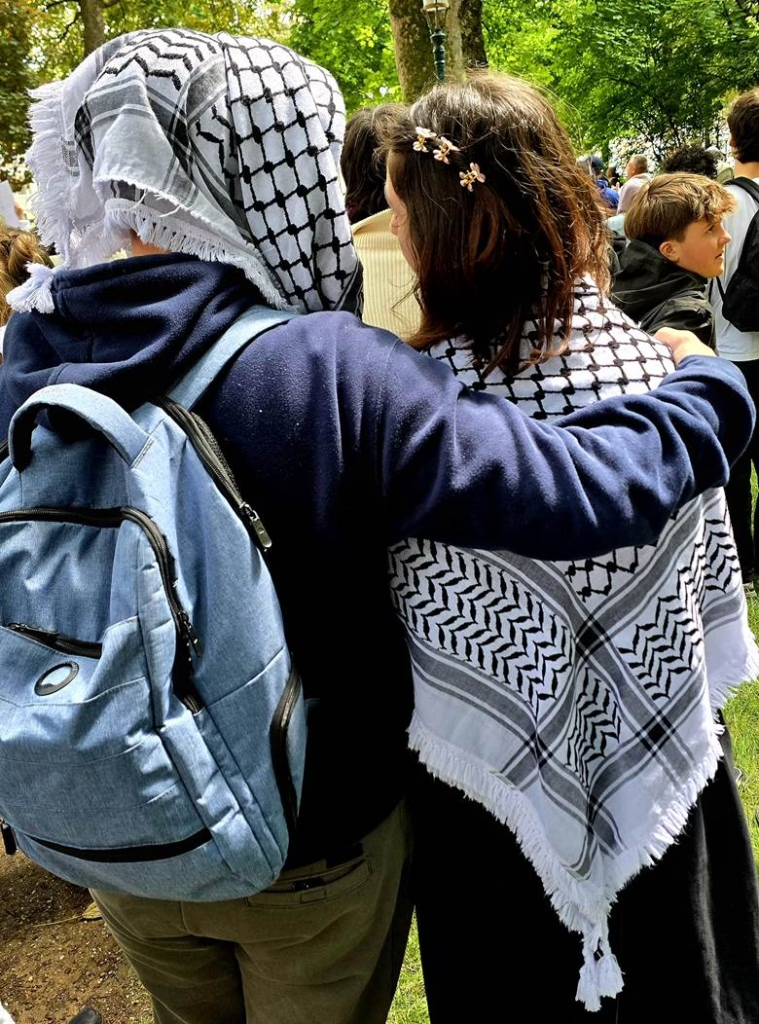
Caption: Two activists at the Palestine Resistance Festival, Brussels (June 7, 2025)
It’s not so much a celebration or joy that we Palestinians feel when Iran hits its targets in Tel Aviv. For us, this event is like a shattered moral universe speaking. We feel and express a grim sense of justice, a complex and morally fraught reaction, rooted in asymmetrical suffering, helplessness, and the brutal arithmetic of oppression.
Deep down, we know: No amount of Israeli suffering will undo the Nakba, the genocide, or our children’s ash-covered bodies. Even if Tel Aviv were flattened, it wouldn’t balance the scales. We know this. We know that revenge doesn’t heal; it just twists the knife. We know that justice is impossible under oppression. True justice would mean accountability for war crimes, returning stolen land, ending apartheid. But since the world denies these, “justice” for Palestinians is reduced to fleeting schadenfreude.
This morning on an “Ahrar Palestine” Telegram channel, I came across a powerful and poetic statement reflecting the deep trauma, existential grief, and moral exhaustion of Palestinians amid Israel’s genocide on Gaza. Its themes, emotional weight, and political implications echoed global anticolonial literatures I had come across before.
As translated from Arabic, the post read: “Even if Tel Aviv crumbles to dust, even if their cities are erased from the earth, it will not soothe the fire inside us. We were not defeated by the rubble that buries us, nor by the hunger that gnaws at our bones. We were defeated the moment children became martyrs; the moment mothers became gravediggers with bare hands. Death runs through us like rivers; massacres mark the chapters of our lives. We waited for bread — but the missiles came instead. We searched for life in the wreckage — and found only pieces of ourselves. The enemy’s ruin does not heal us, because what has been destroyed inside us is greater than any city turned to ash. They did not just steal our land — they stole time, they stole dreams, they stole the unformed features of children.”
The above is a demand for justice that transcends destruction and should not be mistaken for pacifism.
The writer is not just an “angry militant;” though he is clearly embedded in active trauma, he is still deeply reflective. By highlighting “asymmetric harm,” he rejects reductionist narratives like “cycle of violence.” He calls for a moral reckoning by insisting that the world must address “what was destroyed in Palestinians,” — not just buildings.
This Palestinian writer’s reflection on trauma, stolen futures, and the emptiness of revenge finds striking echoes in anti-colonial struggles worldwide. His cry can be said to be the universal cry of the colonized, refusing to let their suffering be reduced to statistics, rejecting the empty promise that the oppressor’s pain will bring justice and insisting on mourning as an act of resistance.
His words mirror Steve Biko’s writings on psychological oppression in South Africa, “The true defeat is the death of our children.” Bobby Sands in Ireland wrote, “We were defeated when children became martyrs.” “What was stolen is not just land, but dreams” mirrors Lakota survivor narratives.
Frantz Fanon wrote about the necessity of resistance in Algeria and how “violence alone cannot heal.” Vietnamese Zen master Thích Nhất Hạnh described the futility of hatred thus: “If you pour a handful of salt into a cup of water, the water becomes undrinkable. But if you pour the salt into a river, people can continue to draw the water. The river is immense, and it has the capacity to receive, embrace, and transform.” Palestinian grief is “the river,” not the cup — too vast for vengeance to purify.
Collective grief, moral resistance, and the tension between vengeance and justice are common themes shared by anti-colonial writers. However, in the Palestinian case, there are also contrasts.
South Africa’s Truth and Reconciliation Commission (TRC) offered a path to healing — something Palestinians are denied under ongoing occupation. Algeria’s revolution succeeded militarily (1962), whereas Palestine remains under occupation. Vietnam’s military victory (1975) contrasts with Palestine’s unending resistance. Ireland’s struggle ended in negotiated peace (Good Friday Agreement), while Palestine’s remains unresolved. Indigenous struggles focus on cultural survival, whereas Palestine’s is ongoing territorial genocide.
Mahmoud Darwish wrote, “We suffer from an incurable disease: hope.” So even this “grim justice” meted out by Iran on Israel is a form of hope deformed by hopelessness — a cry for the world to see what occupation does. Our reaction to the Iranian bombing of Tel Aviv is the howl of a people pushed to the edge of moral exhaustion.
Subscribe to Our Newsletter
Get the latest CounterCurrents updates delivered straight to your inbox.
Note: First published on Medium
_________________
Rima Najjar is a Palestinian whose father’s side of the family comes from the forcibly depopulated village of Lifta on the western outskirts of Jerusalem and whose mother’s side of the family is from Ijzim, south of Haifa. She is an activist, researcher, and retired professor of English literature, Al-Quds University, occupied West Bank.









































